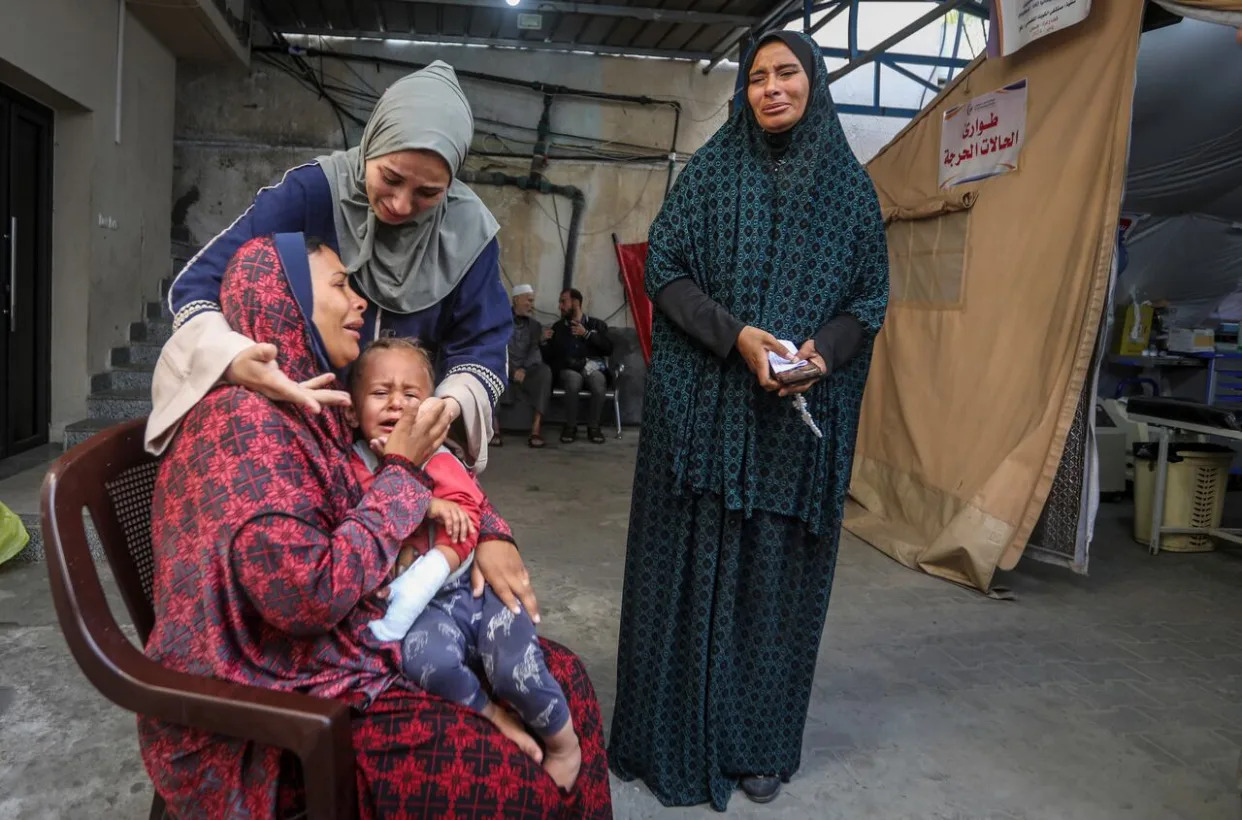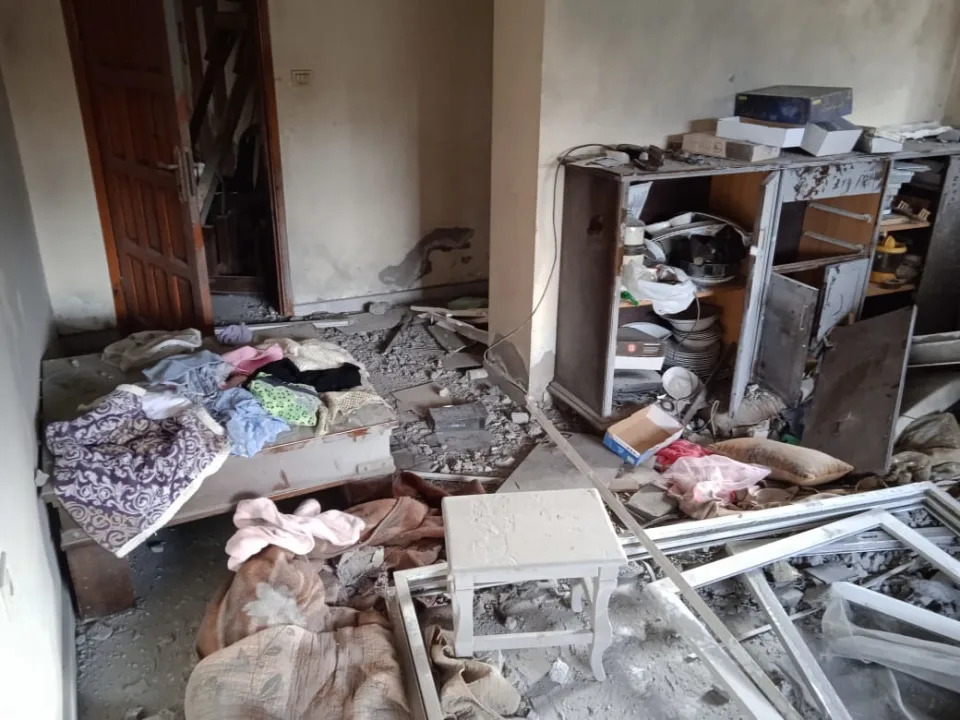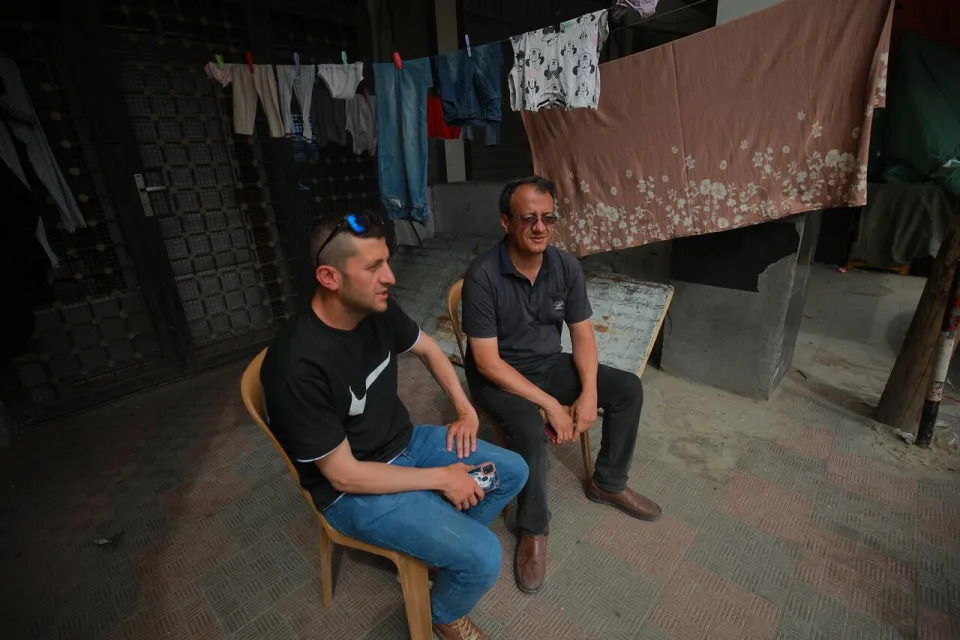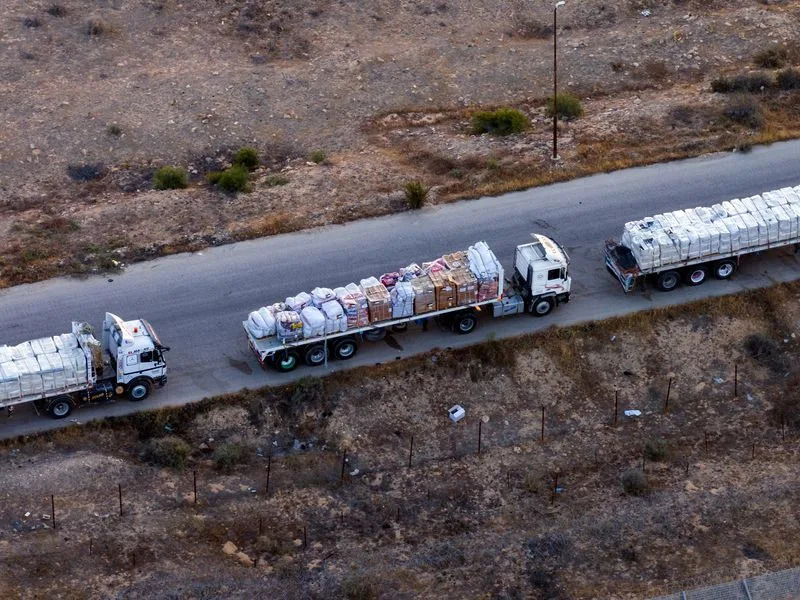CBC
Sun, May 12, 2024

Palestinians mourn their relatives killed in the Israeli bombardment of the Gaza Strip at a hospital in Rafah, Gaza on Friday, May 10, 2024. (Ismael Abu Dayyah/Associated Press - image credit)
Nearly 200 Palestinians have managed to escape Gaza and obtain approval to travel to Canada — but they had to pay thousands of dollars to smuggle themselves into Egypt.
That avenue is now closed off, due to the Israeli military campaign underway in Rafah in the southern Gaza Strip.
On Monday, Hamas announced that it had agreed to a ceasefire deal brokered by Egypt and Qatar. Israel rejected the deal — which it said contained elements it could not accept — and began its incursion into Rafah, where more than a million Gazans have sought shelter from the war.
Among them are the members of Hazim Al Masri's family, who have been travelling from Gaza City to Deir el Balah, a town neighbouring Khan Younis, since October.
"We were always stressed and very sad and always worried," said Al Masri, a resident of Kitchener, Ont. He is still waiting on word from the Canadian government on whether he'll be allowed to bring his siblings and their families to Canada.
Prior to the war, Al Masri had plans to fly to Gaza this month for a family reunion. The eruption of hostilities on October 7 put an end to those plans and started him thinking about getting his loved ones out instead.
In January, the Canadian government announced a new program — the Special Measures for Extended Families of Palestinian Canadians in Gaza — meant to allow relations of Palestinian-Canadians in the war zone to move here temporarily to escape the conflict.
"The day they announced the program, it was a celebration in my house and the kids in Gaza. They were crying from happiness," Al Masri said.
But the program depends on the governments of Israel and Egypt approving individuals for travel through the Rafah crossing into the latter country, once they are placed on a list by Canada.

The Al Masris' home in Gaza City was hit by an airstrike strike during the war. (Hazim Al Masri/CBC News)
Canada has submitted multiple lists of approved candidates for the program to Israel and Egypt, but — for reasons that have not been disclosed — all of those names have been rejected to date. Now, the incursion launched by Israel this week into Rafah has made any further movement into Cairo impossible.
Al Masri said he has raised enough money to get some of his family members out, but others, like his brother Nael, are still stuck on the Gaza side.
Nael Al Masri recently met with a freelancer working for CBC News in Deir El Balah. He said he and his family finally found a small apartment to rent after being constantly on the move since October. Now they're waiting for their applications to come to Canada to be approved.
"They bombed the house beside us and 18 people were martyred," he said. "It was terrifying for the entire family."

Nael Al Masri (right) sits with an unidentified neighbour in his home in Deir el Balah. (CBC News)
In January, Hazim Al Masri filed applications for his three siblings and their families to get them out of Gaza through the program. Two of the three have received codes from the Canadian government — the first step in the application process, which allows them to apply for a visa. But Nael and his family have yet to receive anything from Canada.
"The purpose of applying to this program is to save our souls from death," said Nael. "We were hopeful and happy and the kids were happy, but then … the process is slow."
He said he's lost all hope of escaping the war.
"Right now, I feel like it doesn't really matter to me… Open the border, close the border, either way I'm stuck in the Gaza Strip," he said.
Hope isn't the only thing the Al-Masri family has lost. About a week ago, their uncle, who had made it across the border to Cairo, died after undergoing surgery to amputate an infected leg.
Mike Morris, Green Party member of Parliament for Kitchener South, said he knows Immigration Minister Marc Miller is in a "difficult" position — but he needs to maintain diplomatic channels to get as many people out of Gaza as possible.
"Everything about this program, as you know, has been broken from the start," said Morris. "So, we want to see him continue to prioritize all diplomatic channels to do better by families like Hazim's and so many others across the country."
In a statement, Immigration, Refugees and Citizenship Canada (IRCC) said the department is very concerned about the plight of people in Gaza and is aware that some are exiting Gaza "on their own."
The department says it does not recommend the use of such people-smuggling services and continues to call for Egypt and Israel to approve applicants for exit.
IRCC said that as of April 29, 179 people have completed the process and have been approved to come to Canada. None were evacuated from Gaza through official channels.
Truckers stuck at Rafah crossing fear food won't reach hungry Gaza
Reuters
Fri, May 10, 2024

A drone picture of part of a line of trucks waiting on an Egyptian road along the border with Israel, near the Rafah border crossing with the Gaza Strip
RAFAH, Gaza Strip/ARISH, Egypt (Reuters) - Truck drivers stuck at Egypt's border with Gaza say the food they are taking to the Palestinian enclave could spoil as they wait, exacerbating a hunger crisis among Gazans as war rages on.
Israeli forces seized control of the Rafah border crossing this week and are preparing for a widely expected assault on the city next to the frontier where about 1 million people uprooted by the war have been sheltering.
"The closure of the border crossing is not good for all these trucks because these are fridges, which means machine failure doesn't give a warning. If the (fridge) stops working, then all of the food inside will be ruined," said trucker Ahmed al-Bayoumi.
"Here, there’s no (technician) available to fix things and then we will have to handle the packages again. In any country in the world, food in fridges has priority to be delivered."
Humanitarian workers sounded the alarm this week over the closure of both the Rafah crossing with Egypt and the Kerem Shalom crossing between Israel and Gaza for aid and people.
Dwindling food and fuel stocks could force aid operations to grind to a halt within days in Gaza as vital crossings remain shut, forcing hospitals to close down and leading to more malnutrition, United Nations aid agencies said on Friday.
The Israeli military says that what it calls a limited operation in Rafah is meant to kill fighters and dismantle infrastructure used by Hamas, the militant Islamist group that governs Gaza.
Those words offer little comfort to idle truck drivers.
"Every day, trucks would go in and out of the border crossing and things were flowing," said truck driver Abdallah Nassar.
"But now that the border crossing is closed, we don’t know what our situation is now. And of course, we have food, and these things have expiry dates, and it can go bad."
Most aid for Gaza has been delivered through the Rafah and Kerem Shalom crossings, where aid trucks last entered on May 5.
Before that, several dozen trucks had been crossing through Rafah most days, including the only supplies of fuel going into the enclave.
In April, 1,276 trucks entered through Rafah and 4,395 trucks entered through Kerem Shalom, according to UNRWA, the U.N. Palestinian refugee agency.
NO RELIEF IN SIGHT
The truck drivers face uncertainties as Israel sets out to achieve its goal of destroying Hamas.
Ceasefire talks broke up on Thursday with no agreement to halt the fighting and release hostages captured in the Hamas-led Oct. 7 attacks on Israel that killed 1,200 people, according to Israeli tallies, and precipitated the conflict.
More than 34,000 Gazans have been killed in seven months of war, according to health authorities in the Hamas-controlled enclave who say thousands more dead are probably buried under rubble. Much of the Gaza Strip has been reduced to rubble.
Residents described almost constant explosions and gunfire east and northeast of the city on Friday, with intense fighting between Israeli forces and militants from Hamas and Islamic Jihad.
"The aid going into (Gaza) through Rafah and Kerem Shalom border crossings is like a lifeline for the people there," said Mohamed Rageh Mohamed, head of the north Sinai office of Misr El Kheir Foundation charity.
"There’s no way of living or for these people to survive except if the aid enters Gaza on daily basis."
(Writing by Michael Georgy, Editing by Timothy Heritage)
Israel orders Palestinians to evacuate from more areas of Gaza's Rafah
Updated Sat, May 11, 2024
By Nidal al-Mughrabi and Maytaal Angel
CAIRO/JERUSALEM (Reuters) -Israel called on Saturday for Palestinians in more areas of Gaza's southern city of Rafah to evacuate and head to what it calls an expanded humanitarian area in Al-Mawasi, in a further indication that the military is pressing ahead with its plans for a ground attack on Rafah.
The Israeli military also called on residents and displaced people in the Jabalia area of northern Gaza to clear out, saying it was returning to operate there after it noticed Hamas trying to re-establish its control of the area.
The Palestinian health ministry said at least 37 Palestinians, 24 of them from central Gaza areas, were killed in overnight airstrikes across the enclave, including in Rafah, the Strip's southernmost city bordering Egypt. It does not distinguish how many were civilians or militants.
"They threw fliers on Rafah and said, from Rafah to al-Zawayda is safe, people should evacuate there, and they did, and what has become of them? Dismembered bodies? There is no safe place in Gaza," Khitam Al-Khatib, who said she had lost at least 10 of her relatives in an airstrike on a family house earlier on Saturday, told Reuters.
Al-Zawayda is a small town in central Gaza Strip that has been crowded by thousands of displaced people from across the enclave.
The Israeli military said its aircraft struck tens of targets across Gaza over the past day, adding its ground troops had eliminated some 30 fighters in Zeitoun.
An Israeli airstrike killed at least seven people in a house in Beit Lahiya town in the northern Gaza Strip, all from the same family, medics said. Residents said Israeli tanks have been stationed in the town.
In Rafah, where the health ministry said 16 people were killed, residents told Reuters the new evacuation orders by the Israeli military covered areas in the centre of the city and left little doubt Israel planned to expand its ground offensive there.
"The situation is very difficult, people are leaving their homes in panic," said Khaled, 35, a resident of the Shaboura neighbourhood, an area where the new orders to leave have been issued.
The Israeli military said it was continuing operational activity against Hamas fighters in eastern Rafah and on the Gazan side of the Rafah crossing.
RAFAH INCURSION
Despite heavy U.S. pressure and alarm expressed by residents and humanitarian groups, Israel has said it will proceed with an incursion into Rafah, where more than 1 million displaced people have sought refuge during the seven-month-old war.
Israeli tanks captured the main road dividing Rafah's eastern and western sections on Friday, effectively encircling the eastern side in an assault that has caused Washington to hold up the delivery of some military aid to its ally.
Israel says it cannot win the war without rooting out thousands of Hamas fighters still deployed in Rafah.
About 300,000 Gazans have so far moved towards Al-Mawasi, according to Israeli military estimates released on Saturday.
The war was triggered by a Hamas-led attack on southern Israel on Oct. 7 in which some 1,200 people were killed and more than 250 people taken hostage, according to Israeli tallies.
Israel's military operation in Gaza has killed close to 35,000 Palestinians, according to Gaza's health ministry. The bombardment has laid waste to the coastal enclave and caused a deep humanitarian crisis.
Two crossing points vital for delivery of aid to Gaza were still closed on Saturday. The Palestinian WAFA news agency said the Rafah crossing from Egypt was closed for a fifth day, while another crossing, Kerem Shalom from southern Israel, has been shut for around a week.
The latest evacuation orders came hours after internationally mediated ceasefire talks appeared to be faltering. Hamas said Israel's rejection of a truce offer it had accepted returned things to square one. Israel said the terms did not meet its demands.
The Palestinian militant group also hinted it was reconsidering its negotiation policy. It did not elaborate on whether a review meant it would harden its terms for reaching a deal, but said it would consult with other allied factions.
Israel says it wants to reach a deal under which hostages would be released in exchange for the freeing of Palestinian prisoners held by Israel, but that it is not prepared to end the military offensive.
'EXHAUSTED'
In Deir Al-Balah in the central Gaza Strip, where hundreds of thousands were sheltering, Palestinians mourned relatives during funerals on Saturday.
"Here they are, in pieces, here is my sister-in-law, without a head, my aunt is without a head, what is this injustice? Until when will this go on? We are exhausted, by God we are exhausted, I have lived in tents for the past seven months," said Khatib, sitting near bodies wrapped in white shrouds bearing the names of the dead men and women.
Prime Minister Benjamin Netanyahu's government is under increasing pressure over its military campaign, including from longtime ally the United States.
The Biden administration said on Friday Israel's use of U.S.-supplied weapons may have violated international humanitarian law during its Gaza operation, in its strongest criticism to date of Israel.
But the administration stopped short of a definitive assessment, saying that due to the chaos of the war it could not verify specific instances where use of those weapons might have been involved in alleged breaches.
(Reporting by Maytaal Angel in Jerusalem and Nidal al-Mughrabi in Cairo; Additional reporting by Hatem Khaled in Gaza; Editing by Mark Potter, Frances Kerry and Alex Richardson)
No comments:
Post a Comment